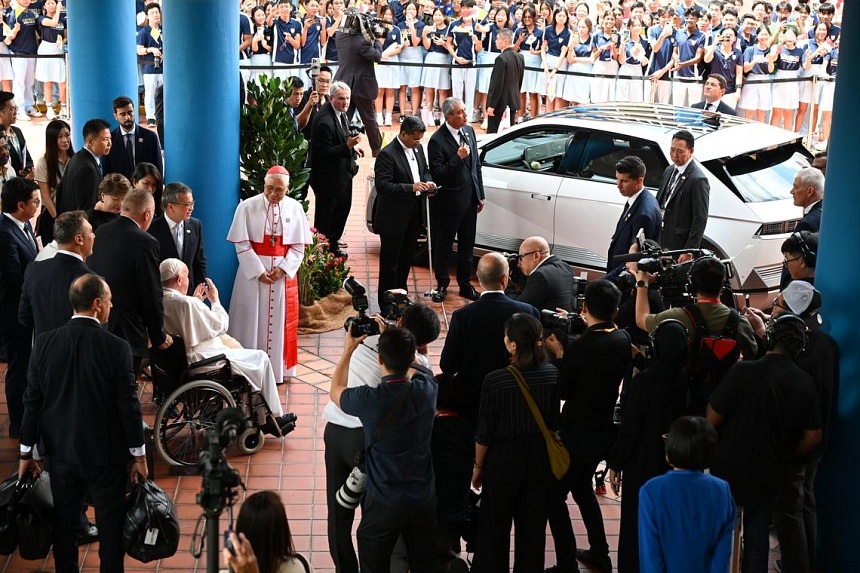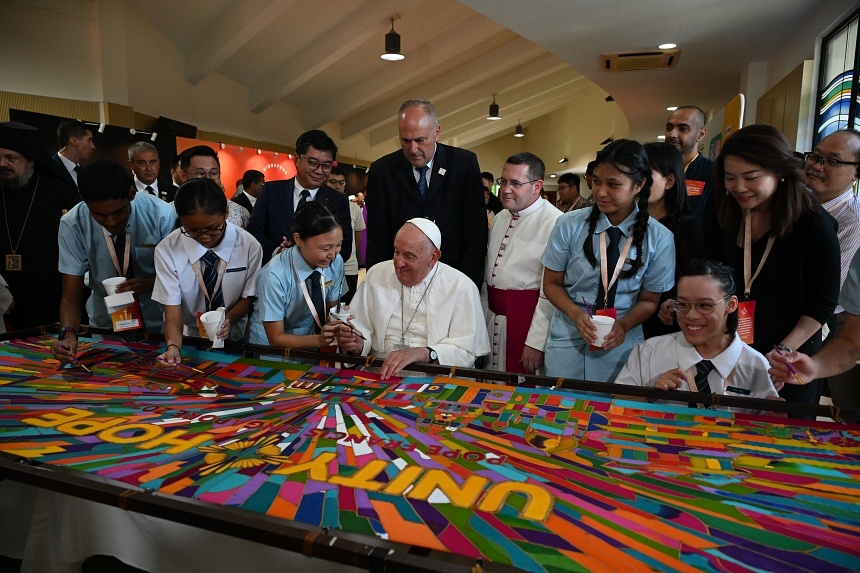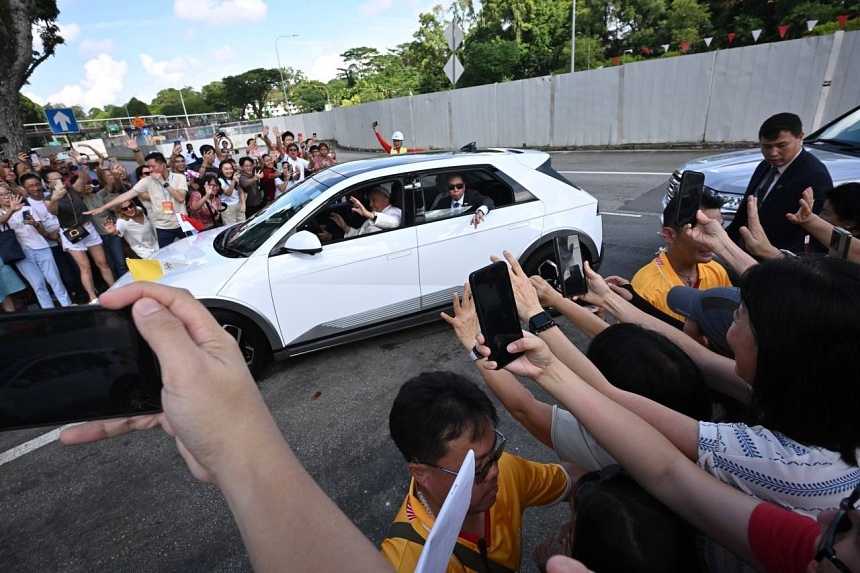SINGAPORE - In an age where technology makes it easy to stay in one’s own bubble, young people must build the courage to leave their comfort zone and take risks, said Pope Francis on Sept 13.
Speaking in Italian at Catholic Junior College (CJC), where he participated in an inter-religious dialogue with youth, the Pope urged the young to have courage to speak up and make their own way in life, while being clear-eyed about both the promises and dangers of social media.
“A young person who is afraid and doesn’t take risks is an old person,” said the Pope.
The 87-year-old pontiff, who is head of the worldwide Catholic Church, was addressing an audience of more than 600 participants from over 50 schools and interfaith and religious organisations.
He was hosted by Minister for Culture, Community and Youth Edwin Tong and the Archbishop of Singapore, Cardinal William Goh, on the last day of his state visit to Singapore.
At the dialogue, three youth leaders shared their experiences fostering inter-religious dialogue in Singapore with the Pope. Among them was Mr Shukul Raaj Kumar, 28, who spoke about his struggles creating a safe space for such dialogue in the face of criticism.
“There are many armchair critics who do not join our engagements or care about this work, despite how absolutely important it is to see each other as belonging to each other,” said the chief coordinator of the Inter-Religious Organisation’s youth wing, who is Hindu.

Pope Francis responded that young people should be critics, but they have to be constructive with their criticism and seek to build things, rather than to tear them down.
“Do you have the courage to criticise, but at the same time the courage to allow yourself to be criticised?” he asked. “If you criticise others, then they can criticise you. And this is (the way for) a sincere dialogue among young people.”
Another panellist, Ms Nicole Law, asked the Pope how people can harness the opportunities offered by artificial intelligence (AI), while managing the risk it poses to mutual understanding.
This is as AI has made it more difficult to distinguish truth from falsehood, noted the educator, who volunteers with the Archdiocesan Catholic Council for Interreligious Dialogue.
The pontiff urged young people to cultivate the skill of discernment, which involves being authentic and engaging others without masks or pretence.
A day earlier, the Pope had acknowledged the promise of AI but cautioned against forgetting to cultivate real and concrete human relationships.
Technology should be used to promote understanding and solidarity, and never to isolate people in a “dangerously false and intangible reality”, he said at his state address at the National University of Singapore’s University Cultural Centre.
At the dialogue, he noted that technology and social media use have facilitated communication for many, especially the young.
“But on the other hand, a young person who lives only for social media is basically a slave to this means of communication,” he said. “What type of young person is that? A person who is scattered.”
The Pope said he was struck by the ability of Singapore’s youth to engage in inter-religious dialogue, which he is a proponent of as every religion is a way to arrive at God.
“Youth is really the time of courage in our lives. You can use this courage for things that really don’t help you, or you can use that courage to move forward and to engage in dialogue,” he said.

The dialogue of young people also sparks discussions between citizens and members of the broader community, he added.
Speaking before the Pope, Mr Tong said religious harmony sets a foundation for a cohesive Singapore, which is why the Government has put in place laws, policies and structures that foster such harmony and gather strength in diversity.
The authorities also work closely with religious and community leaders to build trust in peacetime, and even more so during crises like the Covid-19 pandemic and terror attacks, he added.
Those in the audience who spoke to The Straits Times said they were struck by how the Pope, the face of one of the world’s largest faiths, was so open to other religions.
“It taught me that although you can be strict in your own religion, you can still learn to respect others even if they don’t have the same belief,” said Kayla Wong, a second-year student at CJC.

The 18-year-old, who is not religious, said going to CJC from a neighbourhood secondary school was a “culture shock” at first, but she grew comfortable over time practising some Catholic rituals.
“My Catholic friends don’t expect me to follow their religion, they just want me to see the beauty of their prayers, and sometimes I pray with them,” she said.
Aerospace avionics student Muhammad Danish Iylia, 17, said the pontiff’s message for the different races and religions to live harmoniously resonated with him.
“Growing up, I was surrounded by my own race, but I made friends of other races too in secondary school,” said the first-year student at Institute of Technical Education Central, who is Muslim.
In his conclusion, Pope Francis urged Singaporeans to pass on this practice of interfaith dialogue to future generations, and urged the youth to forge their own way forward. “I’m very happy to be here to meet young people, and I just want to say that you’re very courageous,” he said.
“And for all the young people here, move forward, do not go back. Take risks.”





